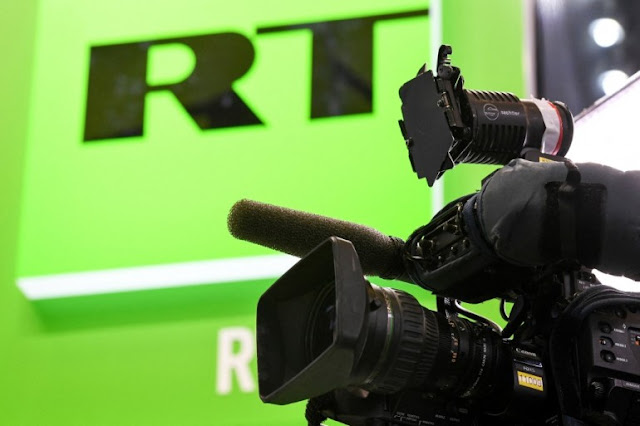by Thinus Ferreira
On the one-year anniversary of Russia's war with Ukraine, Russia's propaganda TV channel Russia Today (RT) has now also been removed from StarSat in South Africa and StarTimes across sub-Saharan Africa after nine months.
Following Russian president Vladimir Putin's decision to invade Ukraine and the subsequent war, Russia Today went dark on MultiChoice's DStv pay-TV service on channel 407 on 2 March last year, after a flurry of severe international sanctions and trade restrictions imposed against Russia.
Russia Today has been widely criticised for its one-sided coverage of Russia's war with Ukraine.
Trade sanctions imposed by the European Union (EU) saw Russia Today's satellite uplinking - a channel feed connection making use of European companies for transponder uplinking - cut off at the same time that Google and other companies blocked RT's YouTube streaming.
MultiChoice makes use of the Intelsat IS-20 satellite as a transponder through which the Randburg-based company leases capacity on and which is subject to the EU blocking of Russia Today.
Two months after Russia Today disappeared from DStv, the channel suddenly popped up on StarSat in South Africa and StarTimes in the rest of Africa since May 2022.
StarTimes and StarSat are run by China's StarTimes Media SA on channel 260.
While China officially takes a neutral position over Russia's war in Ukraine, the country has refused to criticise Russia for its actions or call it an invasion and is helping prevent efforts to condemn Russia at the United Nations.
StarSat told TVwithThinus in May 2022 in response to a media query about how it was able to show Russia Today when satellite transponder companies have been blocked from distributing the channel, that "After we reached a carriage agreement with RT, they deliver the feed to our uplinking station straightly, then we uplink to SES-5 and broadcast to our customers".
StarTimes was uplinking the Russia Today channel feed through SES S.A.'s SES-5 satellite transponder on which StarTimes/StarSat is leasing space.
Similar to Intelsat which has its corporate headquarters in Luxembourg, SES S.A. is a satellite and terrestrial telecommunications network provider also based in Luxembourg in Europe.
In May 2022, SES SA told TVwithThinus that the company had engaged with European regulatory bodies to suspend the distribution of specific Russia Today channels across Europe and that SES "turned the designated signals off per the European
sanctions passed on 2 March 2022" but that Russia Today delivered through SES-5 "is not one that has been banned by the European Union".
SES SA said that the company has been "engaging with our customers and
regulatory authorities to assess both what we can do and must do under the
various legal regimes to which we are subject. SES is prepared to take
immediate action and implement any instructions we receive from regulatory
authorities".
On Thursday Russia Today abruptly disappeared from StarSat and StarTimes after nine months after EU sanctions have now been applied to block the channel on the Midrand-based pay-TV operator's platform as well.
StarSat in a notification says it "regrets to inform our subscribers that effective immediately, Russia Today (channel 260) will be offline until further notice".
"The satellite company responsible for beaming RT to StarSat has terminated the signal due to sanctions implemented by the European Union. Please note for now it will only be available on the StarTimes On App. We apologize for any inconvenience caused."
Meanwhile, Russia Today's work continues on setting up its new African headquarters in South Africa under Paula Slier, the South African TV reporter who previously worked for SABC News and who was posted in Jerusalem, Israel, as RT's correspondent for that region. She is now overseeing the creation of an African bureau.
RT told News24 in July "We are indeed currently focused on developing our English-language Africa hub in South Africa, headed up by Paula Slier - a South Africa native, RT's longtime correspondent and formerly head of RT's Jerusalem bureau".
